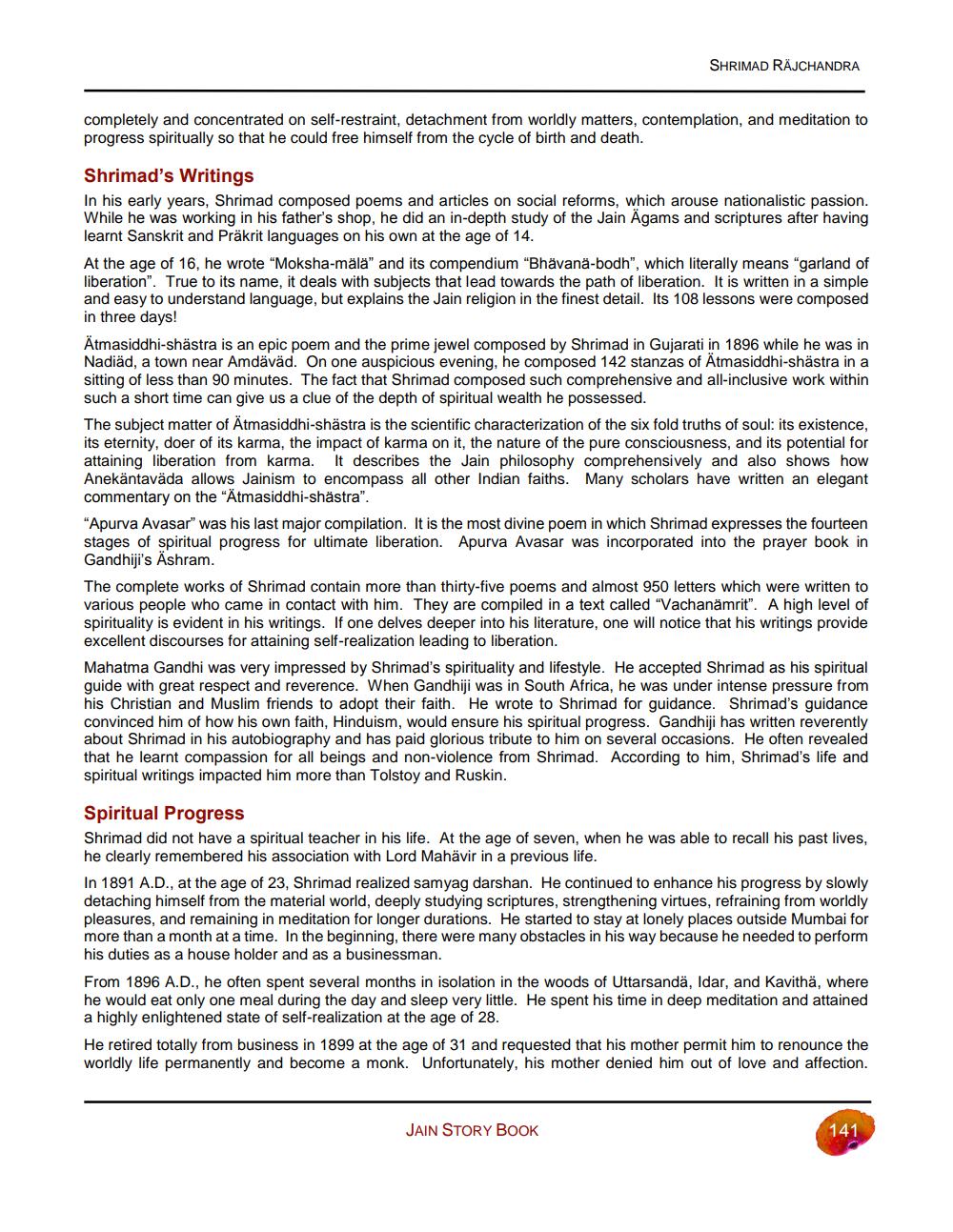________________
SHRIMAD RÄJCHANDRA
completely and concentrated on self-restraint, detachment from worldly matters, contemplation, and meditation to progress spiritually so that he could free himself from the cycle of birth and death.
Shrimad's Writings
In his early years, Shrimad composed poems and articles on social reforms, which arouse nationalistic passion. While he was working in his father's shop, he did an in-depth study of the Jain Ägams and scriptures after having learnt Sanskrit and Präkrit languages on his own at the age of 14.
At the age of 16, he wrote "Moksha-mälä" and its compendium "Bhävanä-bodh", which literally means "garland of liberation". True to its name, it deals with subjects that lead towards the path of liberation. It is written in a simple and easy to understand language, but explains the Jain religion in the finest detail. Its 108 lessons were composed in three days!
Ätmasiddhi-shästra is an epic poem and the prime jewel composed by Shrimad in Gujarati in 1896 while he was in Nadiäd, a town near Amdäväd. On one auspicious evening, he composed 142 stanzas of Ätmasiddhi-shästra in a sitting of less than 90 minutes. The fact that Shrimad composed such comprehensive and all-inclusive work within such a short time can give us a clue of the depth of spiritual wealth he possessed.
The subject matter of Ätmasiddhi-shästra is the scientific characterization of the six fold truths of soul: its existence, its eternity, doer of its karma, the impact of karma on it, the nature of the pure consciousness, and its potential for attaining liberation from karma. It describes the Jain philosophy comprehensively and also shows how Anekäntaväda allows Jainism to encompass all other Indian faiths. Many scholars have written an elegant commentary on the "Ätmasiddhi-shästra".
"Apurva Avasar" was his last major compilation. It is the most divine poem in which Shrimad expresses the fourteen stages of spiritual progress for ultimate liberation. Apurva Avasar was incorporated into the prayer book in Gandhiji's Äshram.
The complete works of Shrimad contain more than thirty-five poems and almost 950 letters which were written to various people who came in contact with him. They are compiled in a text called "Vachanämrit". A high level of spirituality is evident in his writings. If one delves deeper into his literature, one will notice that his writings provide excellent discourses for attaining self-realization leading to liberation.
Mahatma Gandhi was very impressed by Shrimad's spirituality and lifestyle. He accepted Shrimad as his spiritual guide with great respect and reverence. When Gandhiji was in South Africa, he was under intense pressure from his Christian and Muslim friends to adopt their faith. He wrote to Shrimad for guidance. Shrimad's guidance convinced him of how his own faith, Hinduism, would ensure his spiritual progress. Gandhiji has written reverently about Shrimad in his autobiography and has paid glorious tribute to him on several occasions. He often revealed that he learnt compassion for all beings and non-violence from Shrimad. According to him, Shrimad's life and spiritual writings impacted him more than Tolstoy and Ruskin.
Spiritual Progress
Shrimad did not have a spiritual teacher in his life. At the age of seven, when he was able to recall his past lives, he clearly remembered his association with Lord Mahävir in a previous life.
In 1891 A.D., at the age of 23, Shrimad realized samyag darshan. He continued to enhance his progress by slowly detaching himself from the material world, deeply studying scriptures, strengthening virtues, refraining from worldly pleasures, and remaining in meditation for longer durations. He started to stay at lonely places outside Mumbai for more than a month at a time. In the beginning, there were many obstacles in his way because he needed to perform his duties as a house holder and as a businessman.
From 1896 A.D., he often spent several months in isolation in the woods of Uttarsandä, Idar, and Kavithä, where he would eat only one meal during the day and sleep very little. He spent his time in deep meditation and attained a highly enlightened state of self-realization at the age of 28.
He retired totally from business in 1899 at the age of 31 and requested that his mother permit him to renounce the worldly life permanently and become a monk. Unfortunately, his mother denied him out of love and affection.
JAIN STORY BOOK
141




